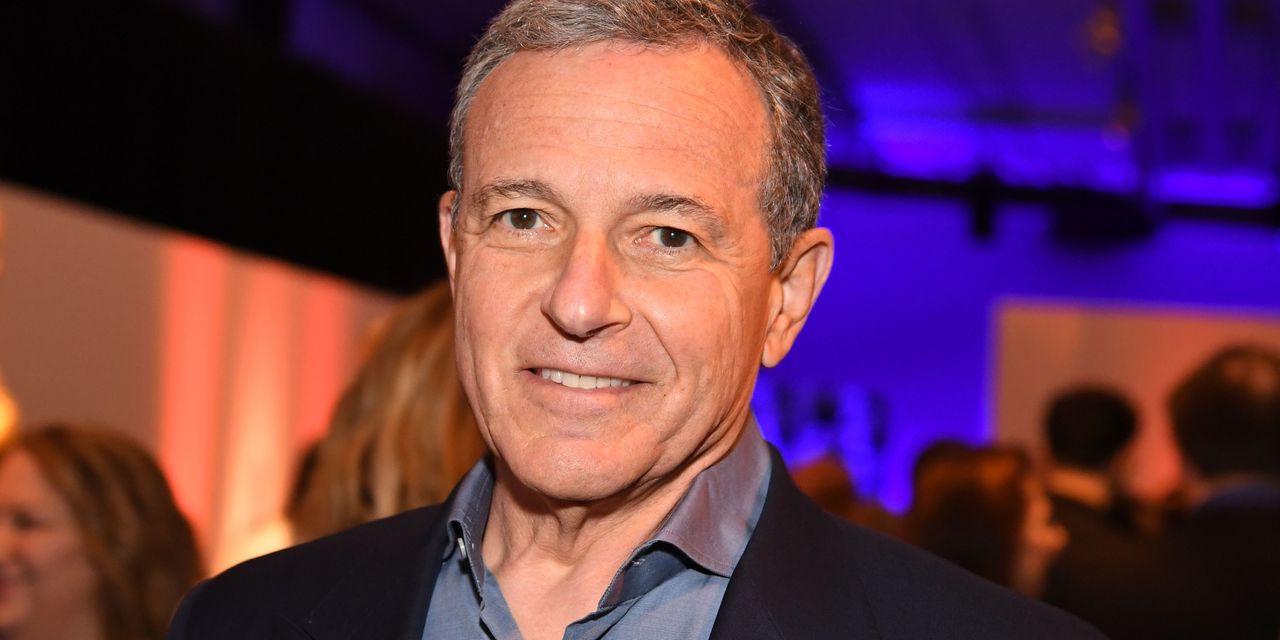In a stunning reversal, the Walt Disney Co.
DIS,
announced Sunday night that Chief Executive Bob Chapek was out, and will be replaced by his predecessor, Robert Iger.
“We thank Bob Chapek for his service to Disney over his long career, including navigating the company through the unprecedented challenges of the pandemic,” board chair Susan Arnold said in a statement. “The Board has concluded that as Disney embarks on an increasingly complex period of industry transformation, Bob Iger is uniquely situated to lead the Company through this pivotal period.”
Iger served as Disney’s CEO from 2005-’20, and served as executive chairman and chairman of the board through 2021. Over his 15-year tenure as CEO, Disney rebuilt itself as a media powerhouse, with the acquisitions of Pixar, Marvel, Lucasfilm and its “Star Wars” properties, and 21st Century Fox.
“Mr. Iger has the deep respect of Disney’s senior leadership team, most of whom he worked closely with until his departure as executive chairman 11 months ago, and he is greatly admired by Disney employees worldwide — all of which will allow for a seamless transition of leadership,” Arnold said in the statement.
Disney’s shares jumped 8% in premarket trade to $99.10.
Disney shares have fallen about 11% since June, and are down 41% year to date, compared to the 5% decline this year by the Dow Jones Industrial Average
DJIA,
of which it is a component.
Disney made clear that Iger’s return will be temporary — two years, with a mandate from the board to set a new strategic direction and develop a successor.
“Wow,” Wedbush analyst Dan Ives said in a tweet Sunday night. “Iger had golden touch at Disney,” he said, adding that his return is a “major strategic move with ramifications across the media and streaming industry looking ahead.”
Iger announced he was stepping down as CEO in February 2020, with Disney saying at the time he would continue to “direct the company’s creative endeavors.”
Earlier this month, Disney stock suffered its worst day since 2001 following what one analyst termed a “massive earnings downgrade,” after the company in its fourth-quarter earnings report forecast significantly softer-than-expected, single-digit growth in the coming fiscal year, far below analysts’ consensus view of 25% growth.
That was all despite Disney’s best year for revenue growth in more than 25 years. Disney’s theme parks grew steadily in the third year of the COVID-19 pandemic, but its largest business segment, media and entertainment distribution, suffered a sharp drop in sales. And while the Disney+ streaming service is rapidly growing, it’s still a money-loser. The service will add a cheaper, advertising-supported tier in December in a bid to increase revenue.
Earlier this month, the Wall Street Journal reported Disney’s companywide plans to cut costs, including a near ban on business travel, a hiring freeze and likely layoffs. “We are going to have to make tough and uncomfortable decisions,” Chapek reportedly said in an internal memo.
Earlier this year, Chapek widely criticized for Disney’s response to Florida’s new “Don’t Say Gay” law. After at first saying Disney would stay out of the political fight, he finally expressed his concerns to Florida Gov. Ron DeSantis and pledged millions to LGBTQ+ causes and paused the company’s political donations in Florida. That drew harsh backlash from conservatives, while many Disney employees participated in walkouts to protest what they said was Chapek’s slow and lackluster response. Chapek apologized to employees, saying “I let you down.”
This past June, Disney extended Chapek’s contract for another three years, with Arnold calling Chapek “the right leader at the right time,” and saying he had the board’s “full confidence.”
Controversial decisions
While Iger was long seen as a champion of creatives, Chapek chafed many at Disney with his decisions, including one to stream new movies on Disney+ the same day they hit theaters — which drew a 2021 lawsuit from actress Scarlett Johansson, who claimed the decision “cheated” her out of millions of dollars in earnings. (The suit was later settled.)
In March, CNBC reported that Iger and Chapek — his handpicked successor — had had a falling out and rarely spoke anymore, and that there was significant internal tension caused by Chapek making key decisions about Disney’s future without Iger’s input. “It was extremely awkward,” one source told CNBC.
Earlier this year in a podcast with Kara Swisher, Iger dismissed “ridiculous” rumors that he might return to lead Disney, saying “You can’t go home again.”
But in a statement Sunday night, Iger said he was “thrilled” to return.
“I am extremely optimistic for the future of this great company and thrilled to be asked by the Board to return as its CEO,” Iger said. “Disney and its incomparable brands and franchises hold a special place in the hearts of so many people around the globe — most especially in the hearts of our employees, whose dedication to this company and its mission is an inspiration. I am deeply honored to be asked to again lead this remarkable team, with a clear mission focused on creative excellence to inspire generations through unrivaled, bold storytelling.”
Kutgun Maral, analyst at RBC Capital Markets, said Iger was “easily” one of the most well-respected executives across its coverage, but the change in leadership has created uncertainty with the company’s big strategy shifts ahead.
“While we certainly have a positive bias over the long-term opportunity, the near- to medium-term implications to shares will depend on what path Iger will take to deliver on his mandate for ‘renewed growth,’” he said.
“We note that his term is only for two years, and it might be difficult to execute against a wide-ranging set of initiatives on top of also managing the murky macro backdrop and supporting work on succession planning,” he added.
— Anviksha Patel contributed to this report
